A Whiff Of Guillotine
What A Recent Incident Can Teach About The Opinion Of The Masses
High Profile Murder
A few days ago, the CEO of a S/P500 company was assassinated by gunshot in the streets of New York, an event caught on CCTV as well. In itself, this is rather noteworthy.
But 2 elements are worth discussing further, with broader implications for investments in US stocks.
Let’s unpack them and see if there is some warning for a sector which is 13% of the USA’s GDP, and for other sectors as well.
A Controversial Target
The CEO targeted and shot in the street was Brian Thompson, CEO of United Healthcare, the #1 healthcare company in the US, mostly selling healthcare insurance, with a market cap above $500B.
It is maybe no surprise that the large health insurance group in the country would be less than popular, with the US spending more than any OECD country in healthcare, for much poorer results.
In fact, life expectancy has started for a decade to decline in the USA, a unique situation among developed nations.
And maybe no other company than UHC has been more at the center of healthcare denial that can more often than not bankrupt an entire family or represent a death sentence.
And doctors themselves are not too happy with United Health, either.
A Less Than Empathetic Public Reaction
For an overview of the public reaction to what is a shocking turn of events, let’s look at the public post of the company announcing the news.
Around 15x more laughing emojis on Facebook than tears.
This of course was not the only reaction, with many shocked by such a display of public hate, especially among financial analysts:
A comment that itself would get hammered by counterpoints largely dominating the responses.
Not only does it get ugly, but it quite really gets bloodthirsty at times:
Today, we mourn the death of United Healthcare CEO Brian Thompson, gunned down.... wait, I'm sorry - today we mourn the deaths of the 68,000 Americans who needlessly die each year so that insurance company execs like Brian Thompson can become multimillionaires.
Innocent in the same way that George Bush is innocent regarding the Iraq War…
It was his leadership decision to use AI to deny medical claims and having the highest denial percentage rate of all insurers. He valued money over lives. That’s why no one cares about his
Despite paying expensive premiums I routinely have to pay out of pocket for any kind of imaging for a lifelong ailment that I need imaging for every year. I’m not sad about what happened.
Bad things happening to bad people is a good thing.
He wasn’t innocent, he is responsible for the deaths of thousands of people.
Nah man, people like you need the reality check. This is real pain and anger coming out that is a direct result of UHC’s unethical practices. This wouldn’t have happened at all if UHC didn’t operate like the mafia. Get a grip.
"Innocent" is doing a lot of heavy lifting there. Maybe they shouldn't have been denying so many claims? Sympathy has been declined because it is out of network.
It's gotta be tough on his family to see that he is being publicly declared to be just as disposable as all the rest of us have been treated by insurance companies.
Overall, social media were flooded with comments comparing the assassination of the CEO to US healthcare and insurance denial of medical care.
Assassination Of Company Policies
ABC News reports that the shooter of UnitedHealthcare chief executive Brian Thompson wrote “deny”, “defend”, “depose” on the shell casings left at the scene.
This echoes the title of a book that details how US insurance companies have made a business of giving people life-saving medical treatments.
So while hard to fully confirm, it is likely that this might be not so much a professional hitman than a very, very angry person over a health insurance claim denied.
The personal wealth the victim derived from his position might have been a trigger for the assassin as well:
First Order Analysis
The first level of takeaway for investors is that UHC policies are going to be in the spotlight, and for all the wrong reasons.
Expect it to become a major topic, especially with the upcoming Trump presidency, Elon’s DOGE department, and overall fewer distractions from the elections.
This will be true not only for UHC but also for all of its competitors.
If your portfolio contains these stocks, it might be the best time to just take a break for a few weeks at least.
As a European, I will mention I have no dog in this fight, and no strong opinion on what needs to be reformed in US healthcare.
Personally, I think healthcare should never bankrupt someone in a moral/Christian position, as you do not choose to get cancer or a heart attack (although some actions like those leading to obesity blur the line).
At the same time, public socialized healthcare European style can be as poor and as deadly as greedy private US healthcare. No system is perfect and Europeans are often too smug about it, while Americans have likely been too passive about it.
Elon might be onto something, too many bureaucrats per doctor.
Second Order Impact
Overall, the highly profitable business of charging Americans 2-10x more than the rest of the world for healthcare and drugs might be not as sustainable as thought.
This goes way beyond just health insurance, but the entire US healthcare system, with insurance the most in-your-face part for the majority of people:
Pharmaceutical companies charge 6-7 digits for cancer treatments.
Generic drugs selling at 20x than the price in neighboring Canada, creating absurd smuggling operations.
Surgery and medical care costs so much that it can be worth traveling to the other side of the world to get better care in private clinics in places like Spain and get months of recovery/holidays for cheaper.
This has always been a looming issue with all the Big Pharma, ambitious biotech startups, and other hospital and care stocks.
All at hoping to get this juicy American tax and insurance payers to subsidize R&D costs, keep dividends flowing, and execs compensation sky high.
Third Order Impact
A secondary impact is to analyze how angry the people truly are. And interestingly, it seems to transcend the political faction line. Essentially everyone who is not rich and had to deal with healthcare insurance in the USA seems to hate it.
The thing is that when the rich and powerful get murdered by the plebes and the plebes cheer in unison, the elite should listen.
It is maybe not a coincidence that the movie Joker, depicting exactly similar sentiments from a society at the edge of social implosion had been such a surprise box office hit and instant media & meme sensation.
As a French citizen, I had to study extensively the “glorious” murderous French Revolution and the times that led to it.
I can positively say that the public sentiment on most of the US elite feels very similar.
This is true for CEOs and execs of most industries that have taken a definitively parasitic behavior in the last decades, through a toxic mix of corruption lobbyism, monopoly/oligopoly, regulatory capture, opaque pricing, offshoring, and media collusion:
Healthcare
Pharma
Defense
Tech
Etc.
If you thought the socialist woke mobs and Trump deplorables were a problem, wait until they find a common cause.
“To punish the oppressors of humanity is clemency; to forgive them is cruelty.”
If the basis of popular government in peacetime is virtue, the basis of popular government during a revolution is both virtue and terror.
Terror is nothing more than speedy, severe, and inflexible justice; it is thus an emanation of virtue; it is less a principle in itself than a consequence of the general principle of democracy, applied to the most pressing needs of the Patrie
Robespierre, the bloodthirsty leader of the French Revolution's “Reign of Terror”, which saw around 45,000 summarily executed
Currently, a few political issues are crystalizing such potential common causes crossing factions to fight against “them”; especially among the 16-35 year olds, the demographic that matters when it comes to mob violence:
Endless overseas wars.
Unconditional support to Israel.
Out of control profiteering on healthcare.
Unaffordable housing.
Crippling student debt.
Untouchable banks and financial institutions.
Upcoming collapse in federal spending, public employment, and de facto bankruptcy of Social Insurance and public healthcare programs.
For now, such opinions are completely without serious political representation.
Trump's “peace through strength” or support to Israel will not stop any war, it might even start a few small ones or a big one, and we saw the Democrats’ program over the last 4 years.
No politician can target the “donor class”, a telling fact being that such a word exists in the first place.
The danger is not that those opinions are growing, at least this is not the ONLY danger.
The issue is that they are becoming so prevalent that only 2 options appear on the horizon:
A clever and daring politician seizes this unexplored segment of the political market and breaks the 2 party system.
If successful, this can create radical change.
If failing, move to option 2.
No politician responds or manages to enact change. Anger keeps building up until a Bastille moment emerges from a random riot, likely in New York, DC, or LA.
A Useful Warning?
This could be wake-up call for the US elite to disarm the ticking bomb in social relations.
At its core are the 3 components of Revolutions:
Ever-mounting inequality.
Immunity from repercussions of parasitic actions and incompetence.
Arrogant, hypocritical elites who stopped performing any social role.
It should noted that it is not so much deprivation than “unfair” inequality that drives popular revolt. People do not revolt solely from hunger, but from seeing others doing far better than them.
Removing any of ONE of these 3 would be enough.
If inequality shrinks, it will remove the main cause of resentment.
If top-level executives, from health insurance CEOs to defense CEOs or judges and politicians and such face consequences for pillaging the public treasury, lawlessness in the streets, insider trading, etc. the feeling that only violence can work will fade away.
If the elites are seen as sacrificing something, like for example the way medieval nobility performed its grueling military duty, the feeling of unfairness will disappear, even with crushing economic inequality.
(A key reason why people like Elon Musk more than other oligarchs is that he has an image of not actually caring much about his wealth besides going to a few parties. It is well known the man has a poor family/personal life and still works massive hours).
Conclusion
The point I am trying to make is not a general comment on the US soon turning into Mad Max, although some days it feels like this is a possibility.
More that the past few decades of Buffett's style of investing is coming to an end. The strategy of focusing on oligopoly/monopoly and parasitic industries or addictive products is being met with an increasing amount of backlash.
When an industry can forever increase its margins because of regulatory capture, lobbyism, shady practices, exploitation of its consumers, and oligopolies, it works until it does not.
It is a perfect business model until the mark/peon starts to kick back. The same way that Victorian-era abuse of workers led to massive strikes, powerful unions, and the rise of Communism.
This kind of backlash usually comes with a bit of collateral damage as well.
So this is a warning call to avoid some of the worst offenders of the healthcare sector, very likely to become an easy target for populists like Trump:
Overpriced cancer drugs soon targeted by Elon.
Massively bureaucratic hospital corporations.
Abusive insurance companies.
And overall, this might even extend to other sectors if no pressure valve starts activating.
Rather vulnerable are the tech giants, especially Meta and Google, but also Apple, for their obvious monopolistic practices, as well as having to some extent been anti-Trump for years. Make no mistake, Zuckerberg and Jeff Bezos claiming neutrality toward the end of the election cycle was not an accident. And everybody hates Big Tech by this point, so it would be popular.
I expect the all-powerful defense sector to be least affected, but as said before, companies like General Dynamics (ships and Abrams tanks) are a lot less vulnerable than let’s say, Lockheed Martin and its over-expensive/under-delivering weapons (F-35).


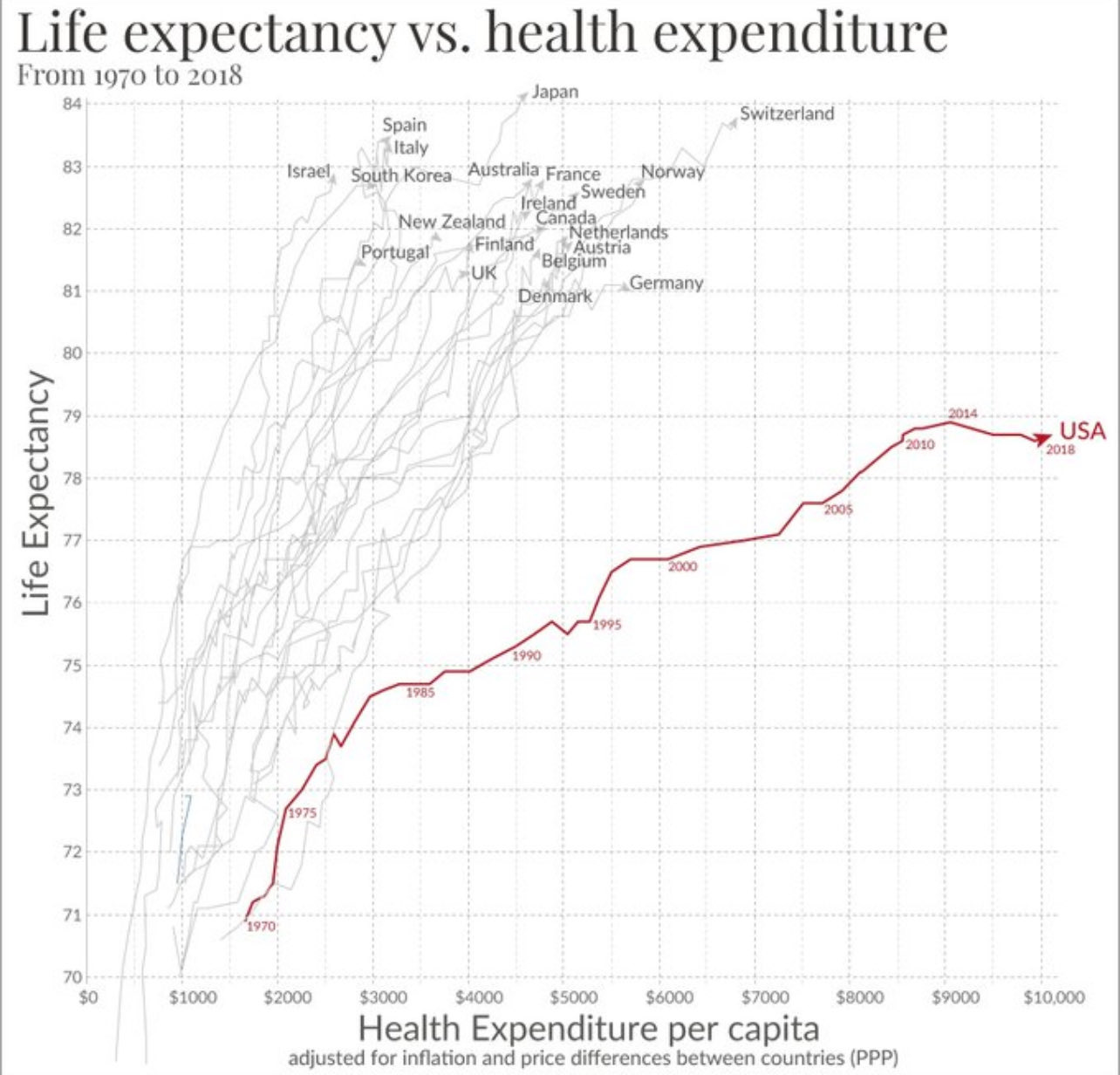
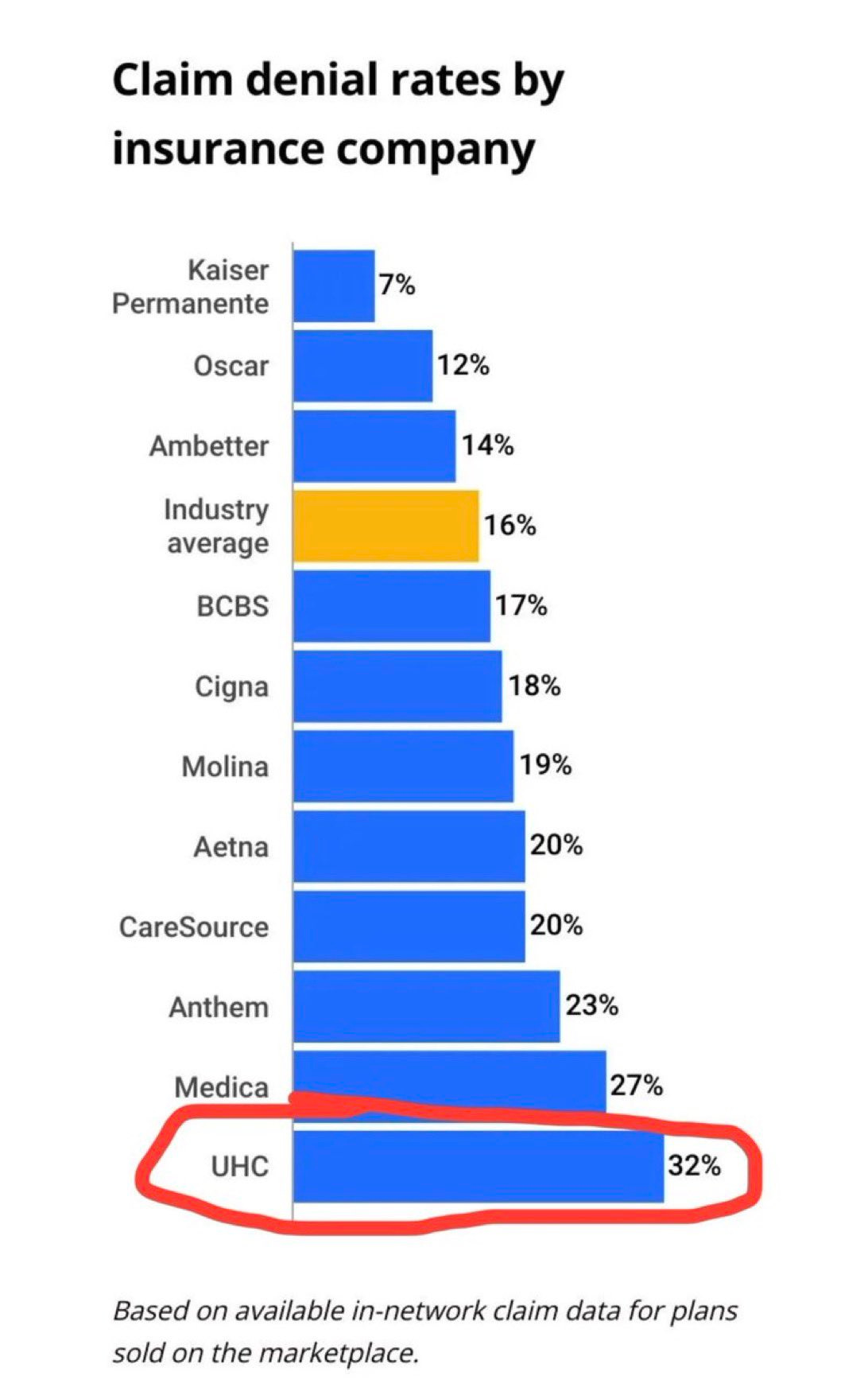
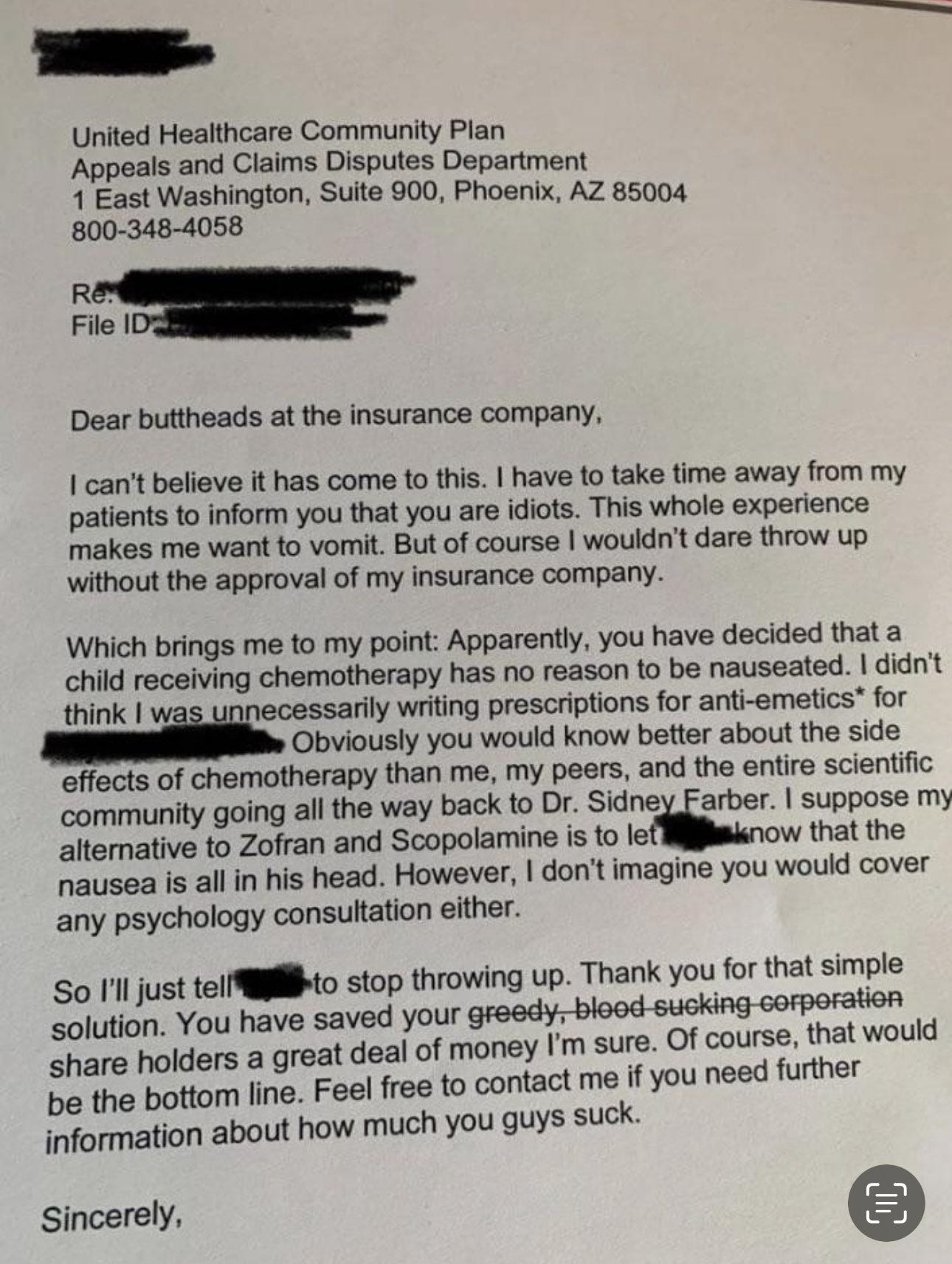
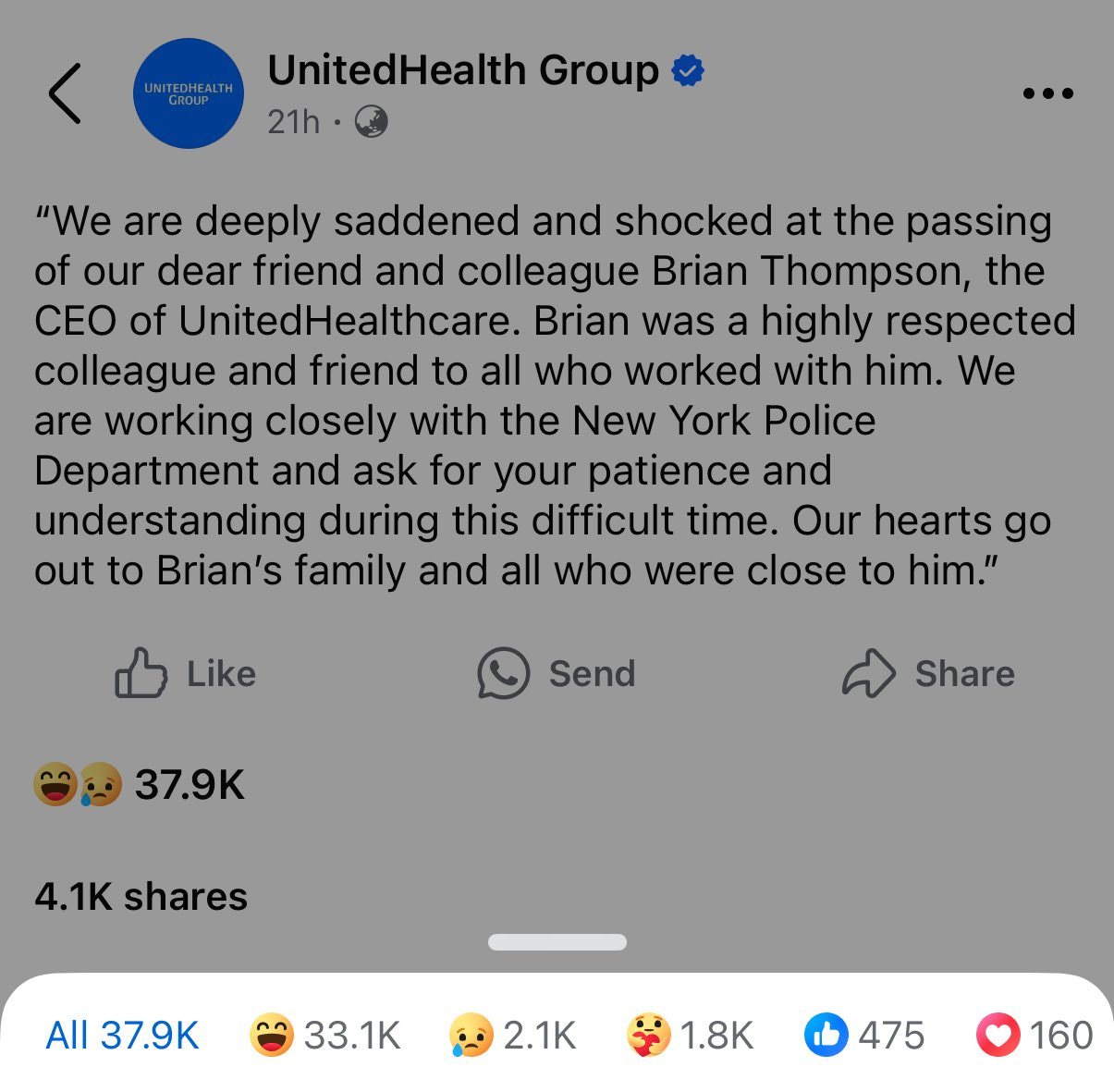
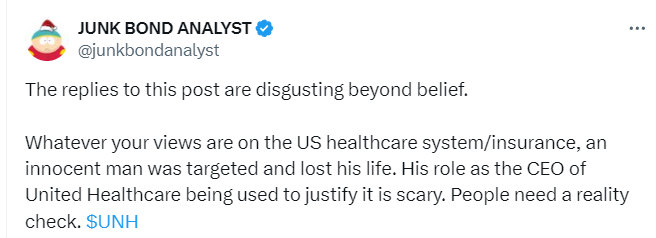
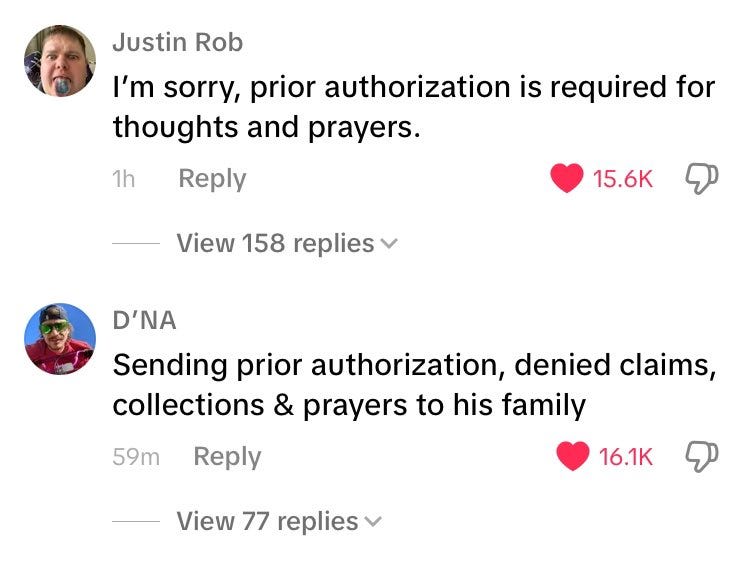

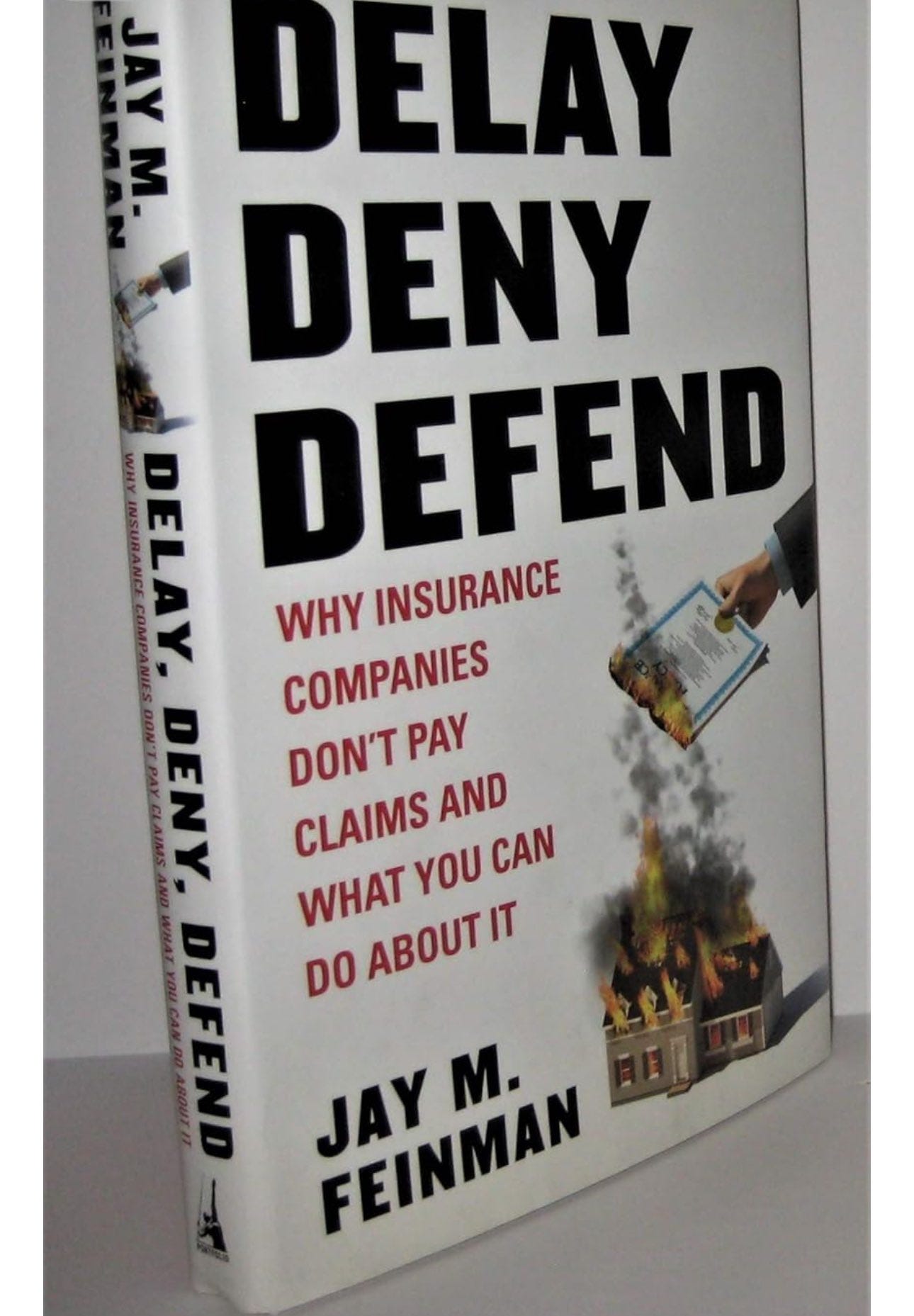
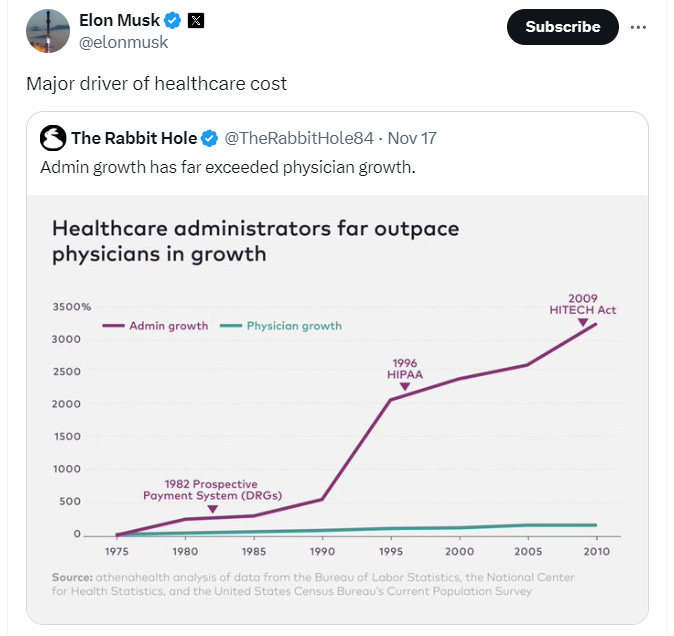
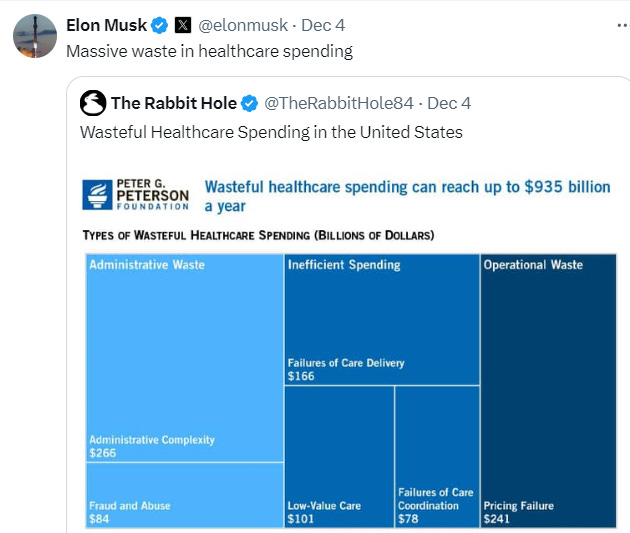

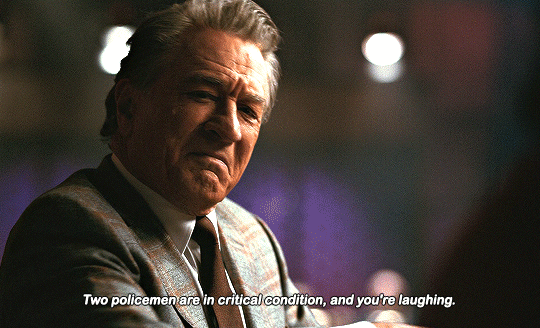

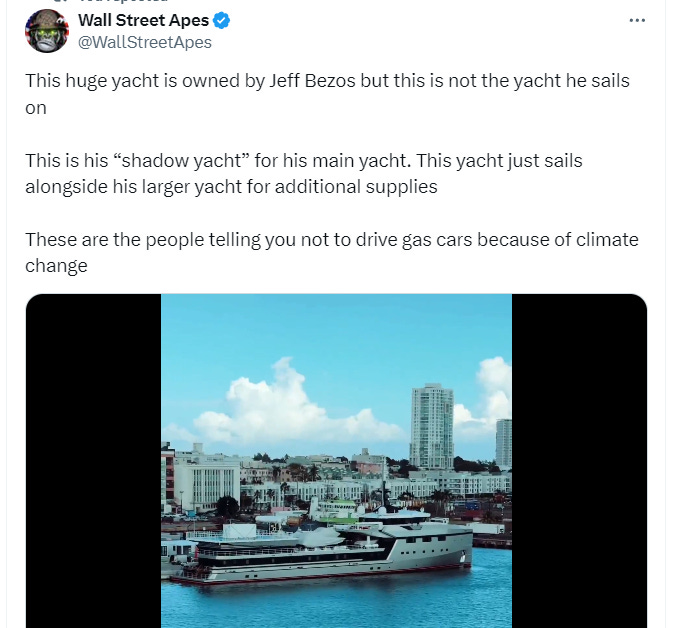

Not for Everyone. But maybe for you and your patrons?
Hello there,
I hope this finds you in a rare pocket of stillness.
We hold deep respect for what you've built here—and for how.
We’ve just opened the door to something we’ve been quietly handcrafting for years.
Not for mass markets. Not for scale. But for memory and reflection.
Not designed to perform. Designed to endure.
It’s called The Silent Treasury.
A sanctuary where truth, judgment, and consciousness are kept like firewood—dry, sacred, and meant for long winters.
Where trust, vision, patience, and stewardship are treated as capital—more rare, perhaps, than liquidity itself.
The two inaugural pieces speak to a quiet truth we've long engaged with:
1. Why we quietly crave for signal from rare, niche sanctuaries—especially when judgment must be clear.
2. Why many modern investment ecosystems (PE, VC, Hedge, ALT, SPAC, rollups) fracture before they root.
These are not short, nor designed for virality.
They are multi-sensory, slow experiences—built to last.
If this speaks to something you've always felt but rarely seen expressed,
perhaps these works belong in your world.
Both publication links are enclosed, should you choose to enter.
https://tinyurl.com/The-Silent-Treasury-1
https://tinyurl.com/The-Silent-Treasury-2
Warmly,
The Silent Treasury
Sanctuary for strategy, judgment, and elevated consciousness.